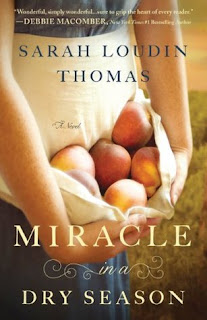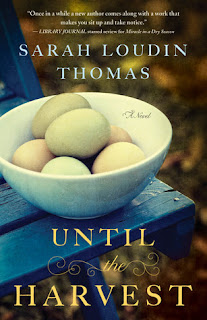

Synopsis
Seven years ago, a hidden betrayal scattered three young friends living in the shadow of Biltmore Estate. Now, when Biltmore Industries master weaver Lorna Blankenship is commissioned to create an original design for Cornelia Vanderbilt's 1924 wedding, she panics knowing she doesn't have the creativity needed. But there's an elusive artisan in the Blue Ridge Mountains who could save her--if only she can find her.
To track the mysterious weaver down, Lorna sees no other way but to seek out the relationships she abandoned in shame. As she pulls at each tangled thread from her old life, Lorna is forced to confront the wounds and regrets of long ago. She'll have to risk the job that shapes her identity as well as the hope of friendship--and love--restored.
In this seamlessly woven historical tale, award-winning Appalachian author Sarah Loudin Thomas delivers a poignant novel of friendship, artistry, restoration, and second chances.
Excerpt
Lorna strolled through the dappled shade at the weekly market on the lawn of the Cathedral of All Souls in Biltmore Village. She wasn’t paying much attention to the wares for sale. She’d just needed to get away from her office, away from the weaving room. If only she could get out of her own head as easily.
“Miss Blankenship!” Lorna turned and slowed her pace. A young woman caught up to her. “Miss Blankenship, I thought that was you.” The girl tried to calm her breathing and laid a hand on Lorna’s arm. “I hope this isn’t too much of an imposition, but I wanted to show you something.”
“Not at all,” Lorna said, slipping her mask of professionalism back into place. The girl looked familiar, but she couldn’t place her. “I’d be delighted to see your wares.”
“Oh, it’s not mine,” the girl said with a blush as she steered Lorna toward a table tucked against the wall of the church. “It’s just that I know you’re the best weaver in all of Asheville, maybe in all of North Carolina”—Lorna allowed a faint smile at the praise—“and I knew you’d be interested.” The girl faltered. “Well, I thought you would be. Of course, my eye isn’t as good as yours, but this cloth . . .” She finally let her words spin out.
“What’s your name?” Lorna asked.
“I’m Bernice Collins. I’ve been working in the weaving room for about six months.” She ducked her head. “I haven’t worked with you directly but I know who you are.”
“I’m glad you’re taking your training seriously enough to examine the work of others,” Lorna said, patting her hand. “Now, show me what you’ve found.” She tried to mask her weariness. The last thing she wanted to do was examine some inferior homespun produced in who knew what backwoods holler. While the traditional fabric had certainly started on small homesteads, where women did everything from shearing the sheep to spinning the thread to weaving the rough cloth, what they made at Biltmore Industries was finer and of a much higher quality. She’d make short work of this and then slip inside the church where she might find a moment’s privacy and stillness.
“See?” Bernice lifted a shawl from a table that mostly offered squash, eggs, and some coarse knitted items. She held the garment out as if it were an offering. Lorna blinked. Then she stretched out her own hand to take the fabric. It was soft—luxurious even—and the pattern was perfect. The finely rendered plaid in the colors of autumn showed crisp definition while still blending and flowing together in a way that gave it a softness and subtlety she’d rarely seen before. For just a moment, despite the heat and humidity of the August day, she felt the bite of an autumn morning and smelled the earthy, tobacco scent of fallen leaves.
If Mrs. Harshaw could see this, she just might change her mind about plaid.
Lorna turned to the woman standing behind the table. “Did you make this?”
“Why do ye need to know?” she said with a scowl. “If ye like it well enough, buy it.”
Lorna pulled out her purse, and the woman stuck out a gnarled hand. Fishing out some coins, Lorna eyed the woman. “What if I wanted more like this? Do you have others?”
“Could be. But I ain’t got ’em today.”
Lorna extended her hand but didn’t release the coins. “Perhaps I could visit the weaver to buy other cloth directly.”
“Oh, aye, and leave me out of it.” The woman snatched Lorna’s money. “I’m not the one makin’ the cloth, but if you want more, you’ll have to talk to me.”
Lorna felt frustration bubble. If the weaver, clearly highly skilled, had other designs, perhaps she—or he for that matter—could be persuaded to share a unique design with Lorna. Otherwise, she was going to be hard-pressed to satisfy Mrs. Harshaw. She thought quickly. “Tell the weaver I’d like the finest piece of cloth she has.” The woman’s expression suggested her guess that the weaver was a woman had been correct.
“Might need a few coins to persuade her to part with her finest,” the woman said in a wheedling voice.
Lorna tamped down her irritation. She fished out another coin and handed it over. “When can you bring it to me?”
The woman snorted. “Don’t come to town but for market. I’ll be back next week with yer pretty piece.”
“Very well,” Lorna snapped. She could wait a week if it meant saving her reputation. “I’ll look forward to seeing what she sends.” The woman grunted and turned to another customer.
Bernice tugged on Lorna’s sleeve. She’d forgotten about the girl. “It really is very fine, isn’t it?” she asked. “Will you try to make something like it?”
Lorna smiled mechanically and pushed the shawl into the bottom of her basket. It would never do for word to get around that she was getting her ideas from other weavers. “I suppose it might provide inspiration,” she said with an airy wave. “But my drafts are all my own.”
Bernice smiled and nodded with a movement bordering on a curtsy before she scurried back to the Biltmore Industries table with its tea towels and carved bowls. Lorna stared after her, not really seeing the market or the people. She’d just uttered the biggest lie of her life. A lie that grew bigger every day she wove one of the patterns she called her own. Because the truth was, none of them were.
Excerpt from These Tangled Threads courtesy of Sarah Loudin Thomas © 2024, Bethany House Publishers.
About the Author
Sarah Loudin Thomas (sarahloudinthomas.com) is the author of numerous acclaimed novels, including The Finder of Forgotten Things, The Right Kind of Fool, winner of the 2021 Selah Book of the Year, and Miracle in a Dry Season, winner of the 2015 INSPY Award. She worked in public relations for Biltmore Estate for six years and is now the director of Jan Karon's Mitford Museum. A native of West Virginia, she and her husband now live in western North Carolina.




















